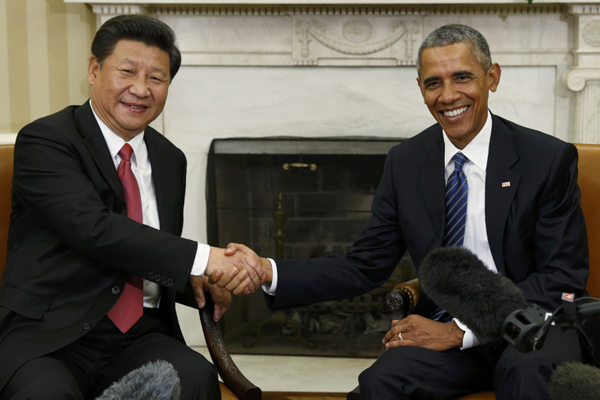 |
|
US President Barack Obama (R) welcomes Chinese President Xi Jinping in the Oval Office of the White House in Washington September 25, 2015. [Photo/Agency] |
What do Sunnylands, Yingtai and Blair House have in common? They are venues that have hosted private dinners between President Xi Jinping and US President Barack Obama in the last three years. While some critics have described these shirtsleeve summits as "pomp-heavy", the truth is, they provide an intimate environment for unscripted talks between the leaders of the world's two largest economies.
In June 2013, Xi, then newly elected president, stopped on his way home from a tour of Latin America in California, where he and Obama met for more than eight hours, including an hour of one-on-one walk. They agreed to build "a new model of major-power relationship" that would steer clear of the "Thucydides' trap" - conflict between a rising and an established power.
In November 2014, after the APEC Economic Leaders' Meeting, Obama stayed on in China for a state visit. He was invited into the Zhongnanhai leadership compound by Xi, where they had five hours of productive discussions, including an hour of late-night tete-a-tete, at Yingtai, a picturesque island. By then, the two countries had reaped some "early harvests" from the new model of China-US relationship. Building on their Sunnylands discussions, Xi talked about how China's experience informs present-day decision-making and Obama explained American values through the lens of history.
On the eve of the White House events during Xi's just concluded state visit to the US, Obama took Xi on a short walk from the West Wing to Blair House, where he has never hosted a foreign leader before. There, flanked by a 17th century Chinese screen, they sat down for dinner, which lasted three hours. After dinner, both welcomed the greater mutual understanding and trust that resulted from it.
Apart from the good optics of the venues and the "power strolls", the real achievement of the meetings lies in substance.
At the bilateral level, these retreats have boosted cooperation and mitigated tension. Examples abound. On all three occasions, the two leaders reiterated their desire to reach a high-standard "Bilateral Investment Treaty". After exchanging and revising their respective negative lists, the two sides are now working to achieve this goal.
Military-to-military ties between the countries are an "underdeveloped" area. At Sunnylands, Xi proposed two confidence-building mechanisms (CBMs) to change the dynamics. After the Yingtai retreat, they announced mutual notification of major military activities and a code of behavior for the safety of maritime and air encounters.
A few days ago, at Rose Garden, the two leaders announced the broadening of the CBMs to cover more activities. Even on cyberspace, widely considered a point of contention in Sino-US ties, Xi and Obama have proven critics wrong by showing a readiness to cooperate in investigations and facilitate international negotiations to establish acceptable norms.
Without Sino-US cooperation, it would have been much more difficult to manage, let alone resolve, many regional and global issues. The Iranian nuclear issue is a case in point.
One of the under-appreciated facts about China-US relations is the growing cooperation to meet global challenges, such as the joint response to the Ebola epidemic in western Africa. A key deliverable at the Sunnylands meeting was the joint pledge to phase down hydrofluorocarbons, or the "super-greenhouse gases". At Yingtai, the two leaders went a step further by announcing significant actions to fight climate change, a move that was widely hailed as a game-changer for international negotiations. After their White House meeting a couple of days ago, they gave a clarion call to the world to secure "an ambitious, successful Paris outcome" at the climate conference in December.
Seventy-years ago, China and the US fought alongside each other to defeat a common enemy. Thirty-six years ago, they came together, driven by an alignment of strategic interests. But then, China was just emerging from a tumultuous decade. Today, China and the US have a high stake in each other's success, just as the world has in a strong and resilient China-US relationship, to which the Xi-Obama summits have undoubtedly contributed. We are all better off because of it.
The author is an analyst with the Foreign Ministry of China.

I’ve lived in China for quite a considerable time including my graduate school years, travelled and worked in a few cities and still choose my destination taking into consideration the density of smog or PM2.5 particulate matter in the region.